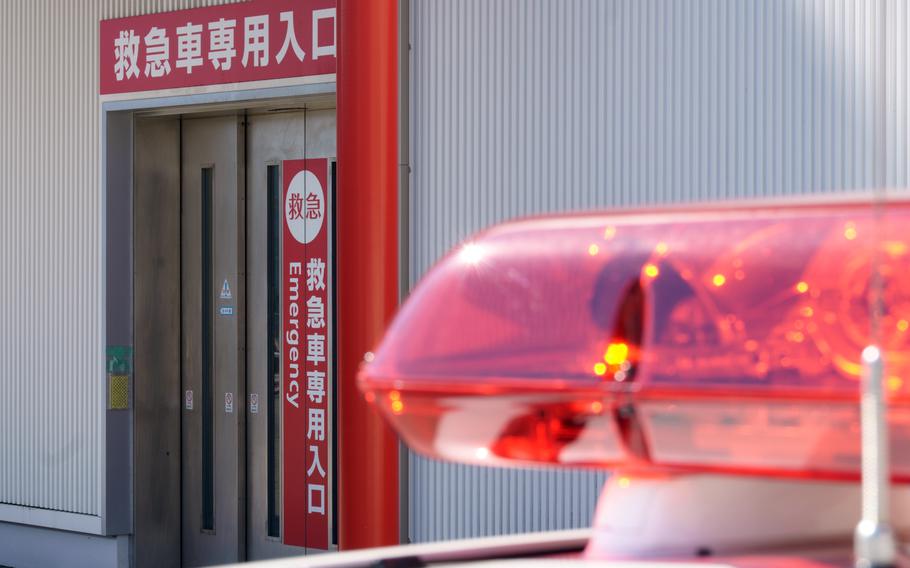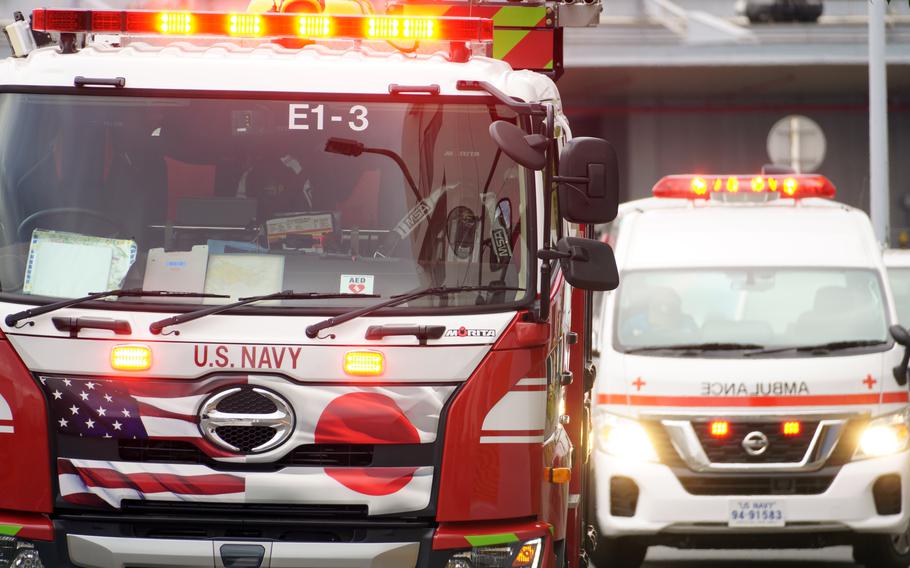
U.S. personnel are “routinely denied access to emergency care” in Japan, with at least 24 people turned away from Japanese hospitals between January 2022 and February 2023, according to a Navy and Marine Corps investigation. (Akifumi Ishikawa/Stars and Stripes)
The 7-year-old daughter of an Okinawa-based Marine died last year after being denied medical care at Japanese hospitals, prompting an investigation that found lack of care has sometimes proved fatal for Defense Department personnel in Japan.
U.S. service members, civilian employees and their families are “routinely denied access to emergency care” in Japan, with at least 24 people turned away from Japanese hospitals between January 2022 and February 2023, according to a Navy and Marine Corps investigation into the 7-year-old’s death.
The girl was leaning against an escalator at an Okinawa mall when she lost balance, fell almost three stories and suffered a serious head injury, according to a copy of the Marine Corps Installations Pacific investigation released last year and obtained by Stars and Stripes.
Japanese first responders tried unsuccessfully for more than 30 minutes to contact two local hospitals and Naval Hospital Okinawa; they also unsuccessfully tried to intubate her, according to the Feb. 23 report.
The first two hospitals denied her because one had “just received another emergency” while the other said it was “beyond their capability,” the report said. The ambulance’s call to the naval hospital used a wrong number, which went to an unmanned telephone.
After calling a U.S. 911 operator, the ambulance was instructed to take the patient to the naval hospital.
That 30-minute delay “removed any opportunity of a meaningful recovery,” experts said in the report. Relocated to Naval Medical Center San Diego within 48 hours, the girl was declared brain dead three weeks later and died after life support was removed.
She is just one of several U.S. personnel in Japan who have either died or suffered medical consequences due to lack of emergency care, according to the report.
The commander of Marine Corps Installations Pacific, Maj. Gen. Stephen Liszewski, along with the former head of the Okinawa-based III Marine Expeditionary Force, Lt. Gen. James Bierman, made several recommendations in the report.
They suggested establishing a new 911 system with similar geolocation capabilities as the U.S. system, hiring “advanced life support paramedics” such as those found at other Marine Corps installations and setting up a working group of experts to explore further options.

Unlike in the U.S., where law guarantees any patient who arrives at an emergency room will receive care, Japan has no such requirement. Hospitals can turn away patients — Japanese or otherwise — at their discretion. (Akifumi Ishikawa/Stars and Stripes)
The problem, however, is not limited to U.S. personnel, but equally affects Japanese citizens, according to the report.
Unlike in the U.S., where law guarantees any patient who arrives at an emergency room will receive care, Japan has no such requirement. Hospitals routinely turn away patients — Japanese or otherwise — at their discretion.
“In December 2022, Japanese ambulances were denied hospital admission 8,000 times and in January 2023 their citizens were denied 16,000 times,” the report states, citing an interview with a person whose name is redacted.
The interviewee clarified that he saw no discrimination between Japanese citizens and patients under the status of forces agreement that specifies the rights and responsibilities of those in Japan with the U.S. military.
The report cited several other cases, without specifying their outcomes. In one case, a Marine with acute appendicitis was refused emergency surgery for eight hours; in another, a military spouse in acute diabetic ketoacidosis was turned away by 20 hospitals.
A Marine “electrocuted on the flight line” was also denied care by nine hospitals, and he was seen only after U.S. Forces Japan called the Ministry of Foreign Affairs to intervene, according to the report.
USFJ, which is tracking denials of care, has not responded to a Monday email seeking comment and an update to those numbers.
Denial of emergency care by Japanese hospitals was one of several complaints raised by DOD civilian employees last year at town halls with Pentagon officials. The meetings sought to address their concerns after civilian access to on-base care in Japan was reduced.
Under a congressional mandate, the Defense Health Agency shifted civilians to space-available appointments in January 2023. The move prioritized care for active-duty service members and their families.
Civilians were encouraged to find health care providers off base in Japan.
Many have done so, but cite large upfront payments, language and cultural barriers and Japanese providers’ ability to turn patients away as obstacles.